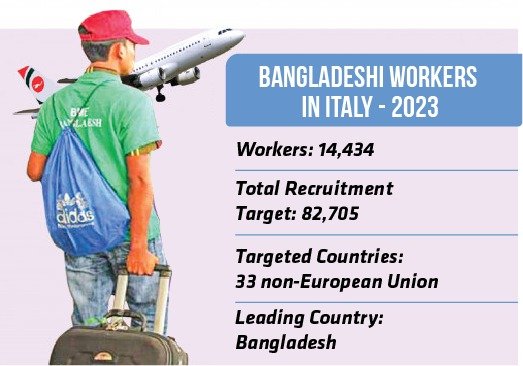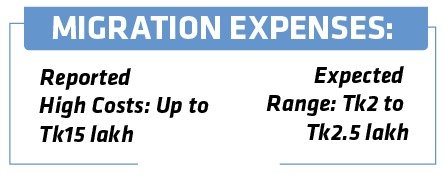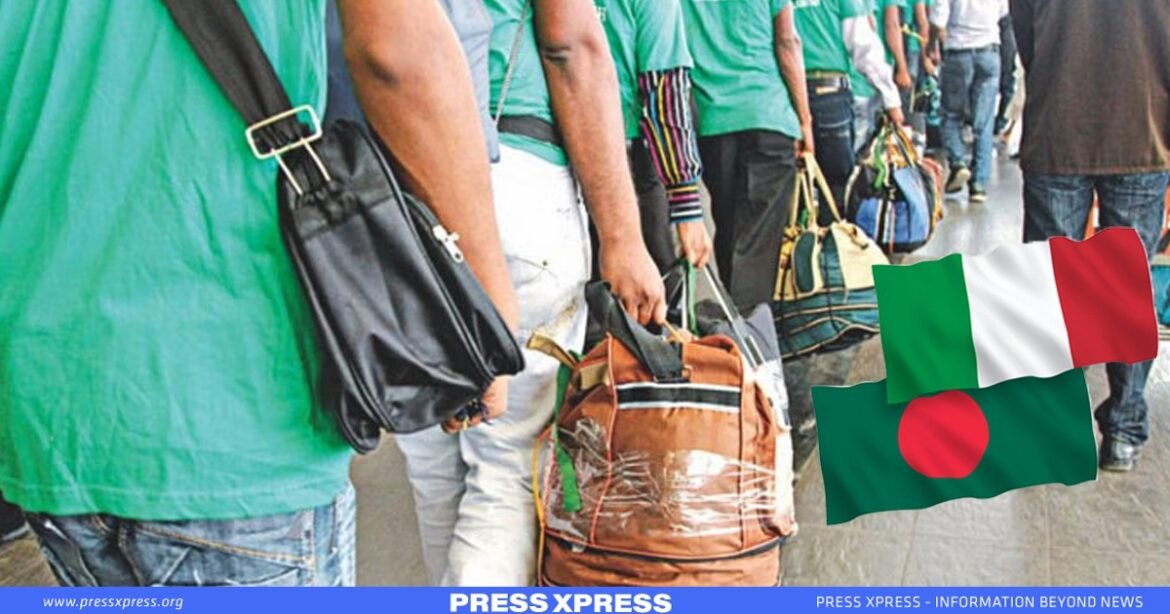In the current year, there are 44,000 seasonal visas open to non-EU citizens, alongside an additional allocation of 38,705 visas designated for non-seasonal employment.
Italy has emerged as one of the most attractive destinations for South Asian workers, particularly from Bangladesh, with a record-breaking number of recruits in 2023. The Mediterranean nation has become a beacon of opportunity for individuals seeking employment in various sectors such as agriculture, hospitality, and manufacturing. The Bureau of Manpower, Employment, and Training (BMET) reports an unprecedented number of Bangladeshi workers being employed in Italy this year (2023).
You can also read: Italy expresses Interest in hiring Bangladeshi manpower
The phenomenon reflects the evolving dynamics of labor migration, economic interdependence, and the efforts to combat irregular migration routes.
Italy’s recent interest in employing more Bangladeshi laborers, particularly in its agriculture and hospitality sectors, represents a significant transition in the nation’s approach to migration and labor.
Unprecedented Hiring Opportunities
As of September 20, 2023, an impressive 14,434 Bangladeshi workers have secured jobs in various Italian industries, marking the highest annual influx ever recorded. This data comes from the Bureau of Manpower, Employment, and Training (BMET). Italy’s recruitment efforts in 2023 are expansive, aiming to hire a total of 82,705 seasonal and non-seasonal workers from 33 non-European Union (EU) nations, with Bangladesh leading the way.

These workers in Italy are distributed across different sectors, with seasonal employees mainly in agriculture and hospitality, while non-seasonal hires encompass various roles, including housekeepers, ship breakers, salesmen, nurses, blacksmiths, auto electricians, lab technicians, drivers, cleaners, welders, construction workers, plumbers, and caretakers. This broad array of opportunities highlights the versatility and adaptability of Bangladeshi workers.
Irregular Migration
The surge in regular labor migrations from Bangladesh to Italy could serve as a crucial measure to combat irregular migration routes. Disastrously, many individuals lose their lives each year while attempting to reach Italy through illegal means, particularly by crossing the perilous Mediterranean Sea. The increase in legal employment channels not only ensures safer and more humane pathways but also contributes to Italy’s labor market and overall economic growth.
Bangladeshi workers have earned a reputation for their diligence and quick adaptation to job opportunities abroad. Asif Anam Siddique, the first secretary (Labour) at the Bangladesh Embassy in Rome, acknowledges the significant role played by Bangladeshi expatriates in Italy. Their presence, along with their strong networks, facilitates the recruitment of new workers, creating a sense of community and support for newcomer.
Complains of high cost
Nonetheless, workers have voiced their grievances, citing exorbitant migration expenses that can reach as high as Tk15 lakh, far exceeding the expected range of Tk2 to Tk2.5 lakh.
Asif Anam Siddique pointed out, ‘Italian authorities do not specify any migration costs beyond the €16 fee for a government revenue stamp. Visa application fees and airfare are the responsibility of the applicants.’


However, in response to these allegations, the diplomat acknowledged, ‘A certain group is taking advantage of the visa process, which necessitates a third-party personal reference.’
This reference requirement has led to third-party intermediaries profiting significantly from the situation.
Shamim Ahmed Chowdhury Noman, former Secretary-General of the Bangladesh Association of International Recruiting Agency (BAIRA), mentioned that several recruiting agencies are involved in sending workers to Italy. However, he expressed unawareness of the high migration expenses being reported.
Visa categories
The seasonal workers program in Italy permits individuals to work in the agriculture or hospitality sectors for 6-9 months during a specific season. However, Bangladeshi farm workers violated program conditions by not returning home after each season, resulting in Italy revoking Bangladesh’s privilege in 2012. Workers who exceeded their visa duration claimed it was insufficient to cover their expenses.
In October 2020, Italy reinstated the program for Bangladeshi seasonal workers through the “Decreto Flussi,” with 44,000 seasonal visas and 38,705 non-seasonal visas available for non-EU citizens. Non-seasonal visas have a standard two-year duration with an option for extension.
Italy’s hiring procedure
In Italy’s hiring procedure, the employer initiates the process by requesting a No-Objection Certificate (NOC, also known as Nulla Osta) from the local DC office via their designated email address. This NOC contains the candidate’s name and passport number. Once issued, the employer sends it to the prospective worker in Bangladesh, who then applies for an Italian visa at the embassy, including the NOC in their application.
Upon arrival in Italy with a valid visa, the worker, in conjunction with the employer, formalizes an employment contract at the local DC office, accompanied by a €16 government-prescribed revenue stamp payment.
For those using the help desk for application submission, there may be a maximum fee of up to €300, but there are no additional costs associated with the application process.
Economic Impact
Apart from the advantages it offers to the Italian labor market, the influx of Bangladeshi workers also has a substantial economic impact. In the first eight months of 2023 alone, Bangladeshi expatriates in Italy sent an impressive $800 million in remittances back home. This financial support contributes significantly to the well-being and development of families and communities in Bangladesh.
Italy’s recruitment of a record number of South Asian workers, particularly from Bangladesh, in 2023 highlights the country’s growing reliance on foreign labor to fill crucial roles in various sectors. The increasing regular migration serves not only as a means to meet labor demands but also as a safer and more humane alternative to irregular migration routes. Bangladeshi workers play a pivotal role in this evolving landscape, contributing not only to Italy’s economy but also to the well-being of their homeland through remittances.
Bangladeshi migrants’ perspectives
For many Bangladeshi migrants, Italy signifies a spark of hope and the possibility of a better future. While Bangladesh’s economy has been growing steadily, the allure of better opportunities and higher wages abroad entices many to pursue their fortune in hospitality, agriculture, and other industries in Italy. However, their journey is riddled with challenges and risks.
Lured by dreams of prosperity, some migrants embark on perilous boat journeys, leaving behind impoverished families and their homeland. In transit countries such as Libya, they confront exploitation and danger before attempting the perilous Mediterranean crossing to Italy. These perilous journeys have resulted in tragic incidents, causing death and suffering to those in search of a better existence.
Italy’s stated desire to hire more Bangladeshi laborers through legal channels offers a glimmer of optimism. The change could provide a more organized and secure migration route, thereby reducing risks and exploitation. Despite the fact that Italy has implemented legal migration measures, the demand still greatly exceeds the available supply. By prioritizing legal migration and investing in reintegration programs, Italy and Bangladesh can forge a prosperous bilateral partnership.


